仁爱版八年级上册不规则动词过去式考查
仁爱八上过去时和过去进行时精讲练习(无答案)
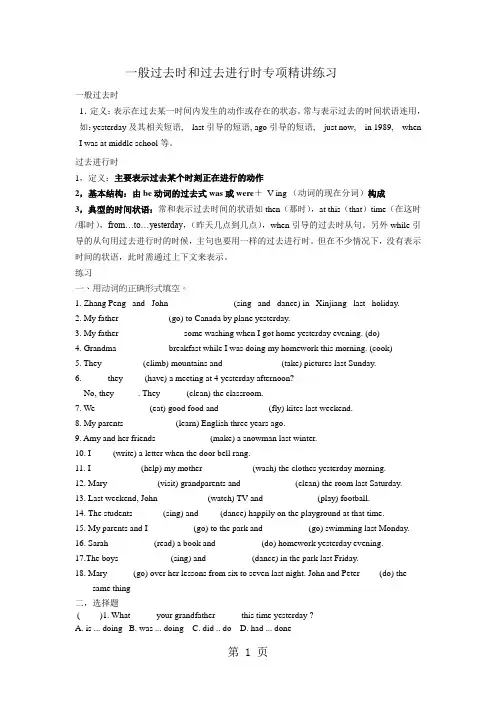
一般过去时和过去进行时专项精讲练习一般过去时1.定义:表示在过去某一时间内发生的动作或存在的状态。
常与表示过去的时间状语连用,如:yesterday及其相关短语, last引导的短语, ago引导的短语, just now, in 1989, when I was at middle school等。
过去进行时1,定义:主要表示过去某个时刻正在进行的动作2,基本结构:由be动词的过去式was或were+V-ing (动词的现在分词)构成3,典型的时间状语:常和表示过去时间的状语如then(那时),at this(that)time(在这时/那时),from…to…yesterday,(昨天几点到几点),when引导的过去时从句。
另外while引导的从句用过去进行时的时候,主句也要用一样的过去进行时。
但在不少情况下,没有表示时间的状语,此时需通过上下文来表示。
练习一、用动词的正确形式填空。
1. Zhang Peng and John ______________ (sing and dance) in Xinjiang last holiday.2. My father ___________(go) to Canada by plane yesterday.3. My father ______________ some washing when I got home yesterday evening. (do)4. Grandma ___________ breakfast while I was doing my homework this morning. (cook)5. They _________(climb) mountains and _____________(take) pictures last Sunday.6. _____ they ____ (have) a meeting at 4 yesterday afternoon?No, they _____. They _____ (clean) the classroom.7. We ____________(eat) good food and ___________(fly) kites last weekend.8. My parents____________(learn) English three years ago.9. Amy and her friends ____________(make) a snowman last winter.10. I ____ (write) a letter when the door bell rang.11. I ___________(help) my mother ___________(wash) the clothes yesterday morning.12. Mary ___________(visit) grandparents and ____________(clean) the room last Saturday.13. Last weekend, John ___________(watch) TV and ____________(play) football.14. The students ______ (sing) and ____ (dance) happily on the playground at that time.15. My parents and I __________(go) to the park and __________(go) swimming last Monday.16. Sarah __________(read) a book and __________(do) homework yesterday evening.17.The boys ___________ (sing) and __________(dance) in the park last Friday.18. Mary _____ (go) over her lessons from six to seven last night. John and Peter ____(do) thesame thing二,选择题( )1. What _____ your grandfather _____ this time yesterday ?A. is ... doingB. was ... doingC. did .. doD. had ... done( )3. ____ you ______ a meeting at four yesterday afternoon ?A. Were ... havingB. Was ... havingC. Did ... haveD. Do ... have( )4. A: I called you at about half past eight last night , but nobody answered .B: Oh , I ______ in my office at that time .A. will workB. was workingC. workedD. had worked( ) 5.He went into the room and _______ the door.A. lockB. lockingC. locksD. locked( ) 6. —What _____ you _______ last week? —I bought a bag.A. did ,buyB. did , boughtC. do, buyD. do, bought( )7. His family _____ TV from ten to twelve last night .A. watchedB. were watchingC. had watchedD. was watching( )8. Li Lei ______ a letter to his friend last night .A. was writingB. was writtenC. will writeD. writes( )9. ---A: Hi , Lin Tao . I didn’t see you at the party .---B: Oh, I ________ ready for the maths exam .A. am gettingB. was gettingC. gotD. have got( )10. A: I called you yesterday evening ,but there was no answer.B: Oh ,I am sorry I ____dinner at my friends home.A.have B.had C.was having D.have had( )11, ----A: Did you notice him come in? ---B: No. I _____ a football game.A. have watchedB. had watchedC. am watchingD. was watching( )12. You must tell us what you _______ at ten yesterday evening .A. didB. was doingC. were doneD. were doing( )13. He asked _______ outside .A. who are singingB. who was singingC. who singing wasD. who is singing( )14. ---A: How did the accident happen ?---B: You know , it ______ difficult to see the road clearly because it _____ .A. was , was rainingB. is , has rainedC. is , is rainingD. will be , will rain( )15. She_________ apples in her garden when I_________ to see her yesterday.A. picked,wentB. was picking, wentC. picked,was goingD. was picking,was going( ) 16. -When did May come back from Hong Kong? -She __ from Hong Kong last Friday.A. come backB. comes backC. returned backD. came back( ) 17. ____ she _____ this dictionary in the bookshop nearby last week?A. Did, buyB. Does, buyC. Did, boughtD. Does, buys( )18. She _____ the room when I went to see her .A. doesn’t cleanB. isn’t cleaningC. didn’t cleaningD. wasn’t cleaning( )19. The Reads _______ lunch when I got to their house .A . were having B. was having C. are having D. is having( ) 20. He ____ to the station this morning and was______ for the train.A. hurry, in timeB. hurries, on timeC. hurried, in timeD. hurried, at time( ) 21. Where _____ Uncle Sun yesterday?A. wasB. wereC. didD. does( )22. I ____ an old friend of mine when I ______ in the street yesterday afternoon .A. met... was walkingB. was meeting ... walkedC. was meeting ... was walkingD. met ... walked( )23. One day when I _______ the post office , I _____ my uncle .A. pass... sayB. was passing ... sawC. passed ... was seeingD. am passing ... am seeing( )24. The student ______ to move the bag of rice _____ he heard the sound of a motorbike .A. was running... whenB. was running ... whileC. runs ... whenD. ran ... while( ) 25.What did you see _________?A. nowB. every dayC. these daysD. just now( ) 26. —_____ he ____ his lunch? — Yes, he did.A. Does ,hasB. Does, haveC. Did, haveD. Did, had三,情景交际1,你跟同学说你上周末去看电影去了,你可以这样说_______________________________________________________________________.2,你昨晚从7:00—9:00一直在做英语作业。
(完整版)仁爱版英语教材不规则动词整理
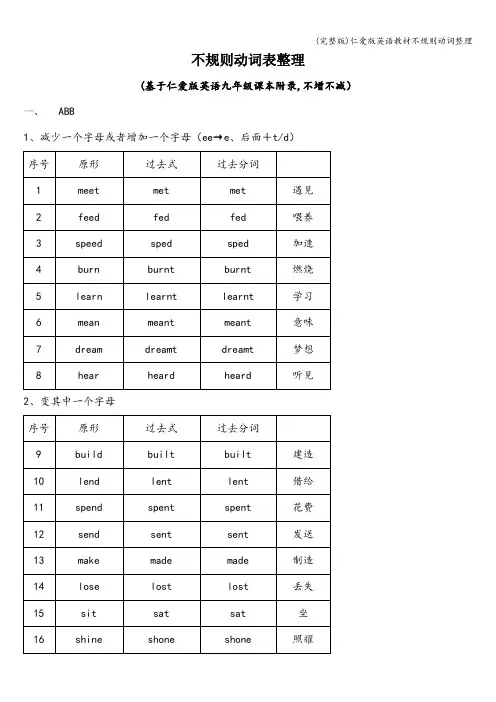
go
went
gone
第19、24、24个过去分词注意双写。
三、AAA
序号
原形
过去式
过去分词
1
cost
cost
cost
花费
2
cut
cut
cut
切割
3
hurt
hurt
hurt
伤害
4
let
let
let
让
5
put
put
put
放
6
read
read
read
读
7
set
set
set
放置
8
shut
shut
shut
不规则动词表整理
(基于仁爱版英语九年级课本附录,不增不减)
一、ABB
1、减少一个字母或者增加一个字母(ee→e、后面+t/d)
序号
原形
过去式
过去分词
1
meet
met
met
遇见
2
feed
fed
fed
喂养
3
speed
sped
sped
加速
4
burn
burnt
burnt
燃烧
5
learn
learnt
learnt
关闭
9
spread
spread
spread
传播
四、ABA
序号
原形
过去式
过去分词
1
become
became
become
变成
2
come
came
come
来
3
仁爱英语2019-2020学年八年级上册上册词性变化及练习(word文档良心出品)
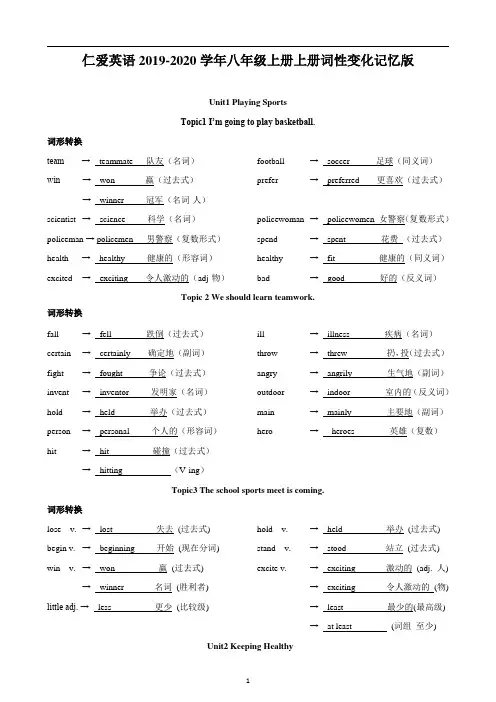
仁爱英语2019-2020学年八年级上册上册词性变化记忆版Unit1 Playing SportsTopic1 I’m going to play basketball.词形转换team → teammate 队友(名词)football → soccer 足球(同义词)win → won 赢(过去式)prefer → preferred 更喜欢(过去式)→ winner 冠军(名词-人)scientist → science 科学(名词)policewoman → policewomen 女警察(复数形式)policeman → policemen 男警察(复数形式)spend → spent 花费(过去式)health → healthy 健康的(形容词)healthy → fit 健康的(同义词)excited → exciting 令人激动的(adj-物)bad → good 好的(反义词)Topic 2 We should learn teamwork.词形转换fall → fell 跌倒(过去式)ill → illness 疾病(名词)certain → certainly 确定地(副词)throw → threw 扔,投(过去式)fight → fought 争论(过去式)angry → angrily 生气地(副词)invent → inventor 发明家(名词)outdoor → indoor 室内的(反义词)hold → held 举办(过去式)main → mainly 主要地(副词)person → personal 个人的(形容词)hero → heroes 英雄(复数)hit → hit 碰撞(过去式)→ hitting (V-ing)Topic3 The school sports meet is coming.词形转换lose v. → lost 失去(过去式) hold v. → held 举办(过去式) begin v. → beginning 开始(现在分词) stand v. → stood 站立(过去式) win v. → won 赢(过去式) excite v. → exciting 激动的(adj. 人) → winner 名词(胜利者) → exciting 令人激动的(物) little adj. → less 更少(比较级) → least 最少的(最高级)→ at least (词组至少)Unit2 Keeping HealthyTopic 1词形转换suggest → suggestion 建议(名词) stomach → stomachache 胃疼(名词) boil → boiled 烧开的(形容词) lie → lay 躺(过去式) → boiling 正在烧的(形容词)→lying (现在分词)serious→ seriously 严肃的(副词) terrible → terribly 糟糕的(副词) worry → worried 焦虑的(形容词)Topic2 I must ask him to give up smoking词形转换cause → because 因为(连词)with → without 没有(反义词)smoke → smoker 吸烟者(名词)active → activity 活动(名词)tomato → tomatoes 西红柿(名词复数)illness → ill 有病的(形容词)surprise → surprised 惊讶的(形容词)potato → potatoes 土豆(名词)healthy → unhealthy 不健康的(反义词)possible → impossible 不可能(反义词)weak → woke 虚弱的(过去式)risk → 冒......的风险(动词中文意思)litter → l乱扔垃圾(动词中文意思)taste → 味道(名词中文意思)Topic3 Must we exercise to prevent the flu?词形转换journal → journalist 记者(名词)question → 询问(动词中文意思)build → built 增强(过去式) build → building 建筑物(名词)final → finally 最后地(副词)crowd → crowded 拥挤的(形容词)they → themselves 他们自己(反身代词)fat → 脂肪(名词中文意思)happy →happiness 幸福(名词)choose → choice 选择(名词)→ unhappy 不高兴的(反义词)→ chose (过去式)cook → cook 厨师(名词)→ chosen (过去分词)it → itself 它自己(反身代词)advise → 动词建议(什么词性)she → herself 她自己(反身代词) advice → 名词建议(什么词性)leave → left 离开(过去式)with → without 缺乏(反义词)→ leaving (现在分词)ahead → 副词(词性)向前exercise → 练习(可数时中文意思)exercise → 锻炼(不可数意思)U3 Our hobbiesTopic 1 What’s your hobby词形转换hobby → hobbies 爱好(复数形式)fun → funny 有趣的(形容词)collect → collection 收藏品(名词)comfortable → comfort 安慰(名词/动词)friend → friendship 友谊(名词)interest → interested 感兴趣的(adj-人)→ friendly 友好的(形容词)→ interesting 有趣的(adj-物)→ unfriendly 不友好的(adj-否定)beauty → beautiful 漂亮的(形容词)own → owner 主人(名词)introduce → introduction 介绍(名词)stick → stuck 粘贴(过去式)danger → dangerous 危险的(形容词)Topic 2 What sweet music!词形转换beautiful → beautiful 美妙地(副词) interest →interesting (现在分词)excite → exciting (现在分词) → interested (过去分词) → excited (过去分词) sing → singer 歌手(名词) easy → easily 容易地(副词) class → classic 经典的(形容词)care → careful 仔细的(形容词) quick → quickly 快速地(副词) → careless 粗心的(形容词反义词) surprise → surpring (现在分词)→ carelessly 仔细地(副词) → surprised (过去分词)Topic 3 What were you doing at this time yesterday?词形转换fall → fell 落下(过去式)hold → held 举办(过去式)agree → agreement 赞同(名词)please → pleased 满意的(adj-人)→ disagree 同意(反义词)→ pleasant 令人愉悦的(adj-物)→ disagreement 不同意(名词) → pleasure 乐意(名词)friend → friendship 友谊(名词)care → careful 仔细的(形容词)→ friendly 友好的(形容词)→ carefully 仔细地(副词)die → dead 死的(形容词)→ carelessly 粗心的(反义副词)→ death 死亡(名词)cut → cut 剪/切(过去式)→ 伤口(名词中文意思)Unit 4 Our WorldTopic 1 Which do you like better, plants or animals?词性转换nature →natural 自然的(adj.) thick →thin 薄的(反义词)die →death (n.)→dead (adj.)→dying (+ing)→died (+ed.)→die out (灭绝) little →less 更少的(比较级)→least 最少的(最高级) .south →southern 南方的(adj.) good →better 更好的(比较级)→least 最好的(最高级) beauty →beautiful 漂亮的(adj.)→more beautiful 更漂亮(比较级) danger →dangerous 危险的(adj.)Topic 2 How can we protect ourselves from the earthquake?词形转换appear → disappear 消失(反义词)snow → snowy 下雪的(形容词)shock → shocked 使震惊(过去式)strike → struck 侵袭(过去式)→ 名词(余震)rain → rainy 下雨的(形容词)nation → national 名族的(形容词)sad → sadness 悲伤(名词)Earth → earthquick 地震(名词)miss → missing 失踪的(形容词)normal → normally 一般地(副词)door → indoor 室内(形容词的)build → built 增强(过去式)→ outdoor 室外→ rebuild (重建)shake → shook 摇动(过去式)injure → injured 受伤的(形容词)Topic 3 The internet makes the world smaller词性转换cheap → cheaper 便宜的(比较级)safely → safe 安全(形容词)cheat → cheating 作弊(现在分词)correct → correctly 正确地(副词)dictionary → dictionaries 字典(复数)reporter → report 报告(动词)improve → improving 提高(现在分词)study → studied 学习(过去式)science → scientist 科学家(名词)change → changing 改变(现在分词)chat → chatting 聊天(现在分词)advice → advise 建议(动词)仁爱英语2019-2020学年八年级上册词性变化(测试版)Unit1 Playing SportsTopic1 I’m going to play basketball.词形转换team → 队友(名词)football → 足球(同义词)win → 赢(过去式)prefer → 更喜欢(过去式)→ 冠军(名词-人)scientist → 科学(名词)policewoman → 女警察(复数形式)policeman → 男警察(复数形式)spend → 花费(过去式)health → 健康的(形容词)healthy → 健康的(同义词)excited → 令人激动的(adj-物)bad → 好的(反义词)Topic 2 We should learn teamwork.词形转换fall → 跌倒(过去式)ill → 疾病(名词)certain → 确定地(副词)throw → 扔,投(过去式)fight → 争论(过去式)angry → 生气地(副词)invent → 发明家(名词)outdoor → 室内的(反义词)hold → 举办(过去式)main → 主要地(副词)person → 个人的(形容词)hero → 英雄(复数)hit → 碰撞(过去式)→ (V-ing)Topic3 The school sports meet is coming.词形转换lose v. → 失去(过去式) hold v. → 举办(过去式) begin v. → 开始(现在分词) stand v. → 站立(过去式)win v. → 赢(过去式) excite v. → 激动的(adj. 人) → 名词(胜利者) → 令人激动的(物) little adj. → 更少(比较级) → 最少的(最高级)→ (词组至少)Unit2 Keeping HealthyTopic 1词形转换suggest → 建议(名词) stomach → 胃疼(名词) boil → 烧开的(形容词) lie → 躺(过去式) → 正在烧的(形容词)→(现在分词)serious→ 严肃的(副词) terrible → 糟糕的(副词) worry → 焦虑的(形容词)Topic2 I must ask him to give up smoking词形转换cause → 因为(连词)with → 没有(反义词)smoke → 吸烟者(名词)active → 活动(名词)tomato → 西红柿(名词复数)illness → 有病的(形容词)surprise → 惊讶的(形容词)potato → 土豆(名词)healthy → 不健康的(反义词)possible → 不可能(反义词)weak → 虚弱的(过去式)risk → (动词中文意思)litter → (动词中文意思)taste → (名词中文意思)Topic3 Must we exercise to prevent the flu?词形转换journal → 记者(名词)question → (动词中文意思)build → 增强(过去式)build → 建筑物(名词)final → 最后地(副词)crowd → 拥挤的(形容词)they → 他们自己(反身代词)fat → (名词中文意思)happy →幸福(名词)choose → 选择(名词)→ 不高兴的(反义词)→ (过去式)cook → 厨师(名词)→ (过去分词)it → 它自己(反身代词)advise → 建议(什么词性)she → 她自己(反身代词)advice → 建议(什么词性)leave → 离开(过去式)with → 缺乏(反义词)→ (现在分词)ahead → (词性)向前exercise → (可数时中文意思)exercise → (不可数中文意思)U3 Our hobbiesTopic 1 What’s your hobby词形转换hobby → 爱好(复数形式)fun → 有趣的(形容词)collect → 收藏品(名词)comfortable → 安慰(名词/动词)friend → 友谊(名词)interest → 感兴趣的(adj-人)→ 友好的(形容词)→ 有趣的(adj-物)→ 不友好的(形容词-否定)beauty → 漂亮的(形容词)own → 主人(名词)introduce → 介绍(名词)stick → 粘贴(过去式)danger → 危险的(形容词)Topic 2 What sweet music!词形转换beautiful → 美妙地(副词) interest → (现在分词)excite → (现在分词) → (过去分词) → (过去分词) sing → 歌手(名词)easy → 容易地(副词) class → 经典的(形容词) care → 仔细的(形容词) quick → 快速地(副词) → 粗心的(形容词反义词) surprise → (现在分词)→ 仔细地(副词) → (过去分词)Topic 3 What were you doing at this time yesterday?词形转换fall → 落下(过去式)hold → 举办(过去式)agree → 赞同(名词)please → 满意的(adj-人)→ 不同意(反义词)→ 令人愉悦的(adj-物)→ 不同意(名词) → 乐意(名词)friend → 友谊(名词)care → 仔细的(形容词)→ 友好的(形容词)→ 仔细地(副词)die → 死的(形容词)→ 粗心的(反义副词)→ 死亡(名词)cut → 剪/切(过去式)→ (名词中文意思)Unit 4 Our WorldTopic 1 Which do you like better, plants or animals?词性转换nature →自然的(adj.)thick →薄的(反义词)die →(n.)→(adj.)→(+ing)→(+ed.)→(灭绝) little →更少的(比较级)→最少的(最高级) .south →南方的(adj.) good →更好的(比较级)→最好的(最高级) beauty →漂亮的(adj.)→更漂亮(比较级) danger →危险的(adj.)Topic 2 How can we protect ourselves from the earthquake?词形转换appear → 消失(反义词)snow → 下雪的(形容词)shock → 使震惊(过去式)strike → 侵袭(过去式)→ (余震)rain → 下雨的(形容词)nation → 名族的(形容词)sad → 悲伤(名词)Earth → 地震(名词)miss → 失踪的(形容词)normal → 一般地(副词)door → 室内(形容词的)build → 增强(过去式)→ 室外→ (重建)shake → 摇动(过去式)injure → 受伤的(形容词)Topic 3 The internet makes the world smaller词性转换cheap → 便宜的(比较级)safely → 安全(形容词)cheat → 作弊(现在分词)correct → 正确地(副词)dictionary → 字典(复数)reporter → 报告(动词)improve → 提高(现在分词)study → 学习(过去式)science → 科学家(名词)change → 改变(现在分词)chat → 聊天(现在分词)advice → 建议(动词)。
八年级动词不规则变化表
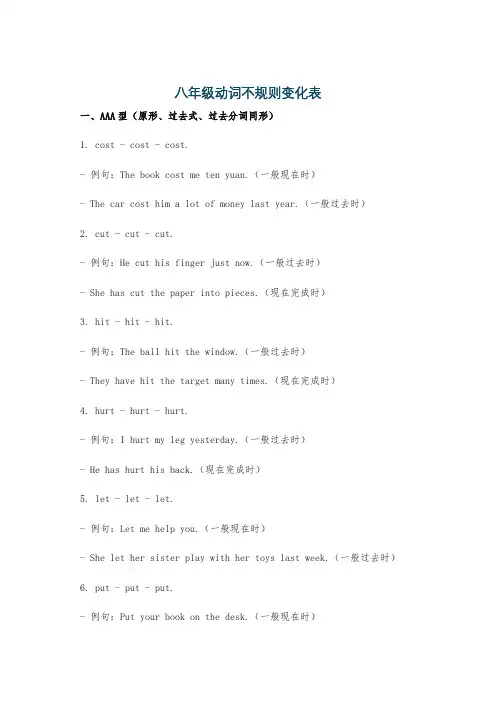
八年级动词不规则变化表一、AAA型(原形、过去式、过去分词同形)1. cost - cost - cost.- 例句:The book cost me ten yuan.(一般现在时)- The car cost him a lot of money last year.(一般过去时)2. cut - cut - cut.- 例句:He cut his finger just now.(一般过去时)- She has cut the paper into pieces.(现在完成时)3. hit - hit - hit.- 例句:The ball hit the window.(一般过去时)- They have hit the target many times.(现在完成时)4. hurt - hurt - hurt.- 例句:I hurt my leg yesterday.(一般过去时)- He has hurt his back.(现在完成时)5. let - let - let.- 例句:Let me help you.(一般现在时)- She let her sister play with her toys last week.(一般过去时)6. put - put - put.- 例句:Put your book on the desk.(一般现在时)- He put on his coat and went out.(一般过去时)7. read - read - read.- 注意:read的过去式和过去分词读音为[red]。
- 例句:I read a book yesterday.(一般过去时)- She has read this novel three times.(现在完成时)二、ABA型(原形与过去分词同形)1. become - became - become.- 例句:He became a teacher last year.(一般过去时)- She has become very popular.(现在完成时)2. come - came - come.- 例句:He came to school late yesterday.(一般过去时)- They have come to realize the importance of English.(现在完成时)3. run - ran - run.- 例句:He ran very fast in the race.(一般过去时)- She has run out of money.(现在完成时)三、ABB型(过去式与过去分词同形)1. bring - brought - brought.- 例句:He brought his book to school yesterday.(一般过去时)- She has brought some flowers for her mother.(现在完成时)2. build - built - built.- 例句:They built a house last year.(一般过去时)- The workers have built many tall buildings in this city.(现在完成时)3. buy - bought - bought.- 例句:I bought a new pen yesterday.(一般过去时)- She has bought a lot of clothes this month.(现在完成时)4. catch - caught - caught.- 例句:The police caught the thief last night.(一般过去时)- He has caught a cold.(现在完成时)5. dig - dug - dug.- 例句:They dug a hole in the garden.(一般过去时)- The workers have dug a well.(现在完成时)6. feel - felt - felt.- 例句:I felt very happy yesterday.(一般过去时)- She has felt much better since she took the medicine.(现在完成时)7. fight - fought - fought.- 例句:They fought against the enemy bravely.(一般过去时)- The soldiers have fought for their country.(现在完成时)8. find - found - found.- 例句:He found his wallet under the bed.(一般过去时)- She has found a new job.(现在完成时)9. get - got - got/gotten.- 例句:I got a letter from my friend yesterday.(一般过去时)- He has got a lot of knowledge from books.(现在完成时,美式英语常用gotten)10. hang - hung - hung(悬挂);hang - hanged - hanged(绞死、吊死)- 例句:He hung a picture on the wall.(一般过去时,悬挂)- The murderer was hanged.(一般过去时,绞死)11. have - had - had.- 例句:I had a great time yesterday.(一般过去时)- She has had a lot of experience.(现在完成时)12. hear - heard - heard.- 例句:I heard a strange noise last night.(一般过去时)- He has heard the news already.(现在完成时)13. hold - held - held.- 例句:He held a meeting yesterday.(一般过去时)- She has held this position for a long time.(现在完成时)14. keep - kept - kept.- 例句:He kept his promise.(一般过去时)- She has kept this book for two weeks.(现在完成时)15. lay - laid - laid.- 例句:She laid the baby on the bed.(一般过去时)- The hen has laid many eggs.(现在完成时)16. lead - led - led.- 例句:He led the team to victory.(一般过去时)- She has led a hard life.(现在完成时)17. leave - left - left.- 例句:He left school early yesterday.(一般过去时)- She has left her hometown.(现在完成时)18. lend - lent - lent.- 例句:I lent him my book yesterday.(一般过去时)- She has lent some money to her friend.(现在完成时)19. lose - lost - lost.- 例句:He lost his keys yesterday.(一般过去时)- She has lost her way.(现在完成时)20. make - made - made.- 例句:He made a model plane yesterday.(一般过去时)- She has made a lot of friends.(现在完成时)21. mean - meant - meant.- 例句:What did he mean?(一般过去时)- This word has meant different things in different contexts.(现在完成时)22. meet - met - met.- 例句:I met my old friend in the street yesterday.(一般过去时)- She has met many difficulties.(现在完成时)23. pay - paid - paid.- 例句:He paid ten yuan for the book.(一般过去时)- She has paid all her debts.(现在完成时)24. say - said - said.- 例句:He said he was happy.(一般过去时)- She has said goodbye to her parents.(现在完成时)25. sell - sold - sold.- 例句:He sold his old bike yesterday.(一般过去时)- She has sold all her paintings.(现在完成时)26. send - sent - sent.- 例句:I sent a letter to my mother yesterday.(一般过去时)- She has sent some gifts to her friends.(现在完成时)27. shine - shone - shone(发光、照耀);shine - shined - shined(擦亮)- 例句:The sun shone brightly yesterday.(一般过去时,发光)- He shined his shoes this morning.(一般过去时,擦亮)28. sit - sat - sat.- 例句:He sat on the chair.(一般过去时)- She has sat here for an hour.(现在完成时)29. sleep - slept - slept.- 例句:I slept well last night.(一般过去时)- She has slept for ten hours.(现在完成时)30. smell - smelt - smelt(也可smelled - smelled)- 例句:The flowers smelt sweet.(一般过去时)- The food has smelt strange.(现在完成时)31. speak - spoke - spoken.- 例句:He spoke at the meeting yesterday.(一般过去时)- She has spoken English for many years.(现在完成时)32. spell - spelt - spelt(也可spelled - spelled)- 例句:He spelt the word wrong.(一般过去时)- She has spelt this word correctly.(现在完成时)33. spend - spent - spent.- 例句:He spent two hours doing his homework yesterday.(一般过去时)- She has spent a lot of money on clothes.(现在完成时)34. stand - stood - stood.- 例句:He stood at the door.(一般过去时)- She has stood there for a long time.(现在完成时)35. sweep - swept - swept.- 例句:She swept the floor yesterday.(一般过去时)- They have swept the classroom.(现在完成时)36. teach - taught - taught.- 例句:He taught us English last year.(一般过去时)- She has taught in this school for five years.(现在完成时)37. tell - told - told.- 例句:He told me a story yesterday.(一般过去时)- She has told the truth.(现在完成时)38. think - thought - thought.- 例句:I thought he was right.(一般过去时)- She has thought about this problem.(现在完成时)39. understand - understood - understood.- 例句:I understood his meaning.(一般过去时)- She has understood the situation.(现在完成时)40. win - won - won.- 例句:Our team won the game yesterday.(一般过去时)- He has won many prizes.(现在完成时)四、ABC型(原形、过去式、过去分词都不同形)1. be - was/were - been.- 例句:I was at home yesterday.(一般过去时,第一人称单数)- They were at school last week.(一般过去时,第三人称复数)- She has been to Beijing.(现在完成时)2. begin - began - begun.- 例句:He began to study English last year.(一般过去时)- She has begun a new project.(现在完成时)3. blow - blew - blown.- 例句:The wind blew strongly yesterday.(一般过去时)- The leaves have been blown away.(现在完成时,被动语态)4. break - broke - broken.- 例句:He broke the window yesterday.(一般过去时)- The cup has been broken.(现在完成时,被动语态)5. choose - chose - chosen.- 例句:He chose a red pen.(一般过去时)- She has chosen to study abroad.(现在完成时)6. do - did - done.- 例句:I did my homework yesterday.(一般过去时)- She has done a lot of work.(现在完成时)7. draw - drew - drawn.- 例句:He drew a picture yesterday.(一般过去时)- She has drawn many beautiful pictures.(现在完成时)8. drink - drank - drunk.- 例句:He drank a glass of water just now.(一般过去时)- She has drunk too much wine.(现在完成时)9. drive - drove - driven.- 例句:He drove to work this morning.(一般过去时)- She has driven for three hours.(现在完成时)10. eat - ate - eaten.- 例句:I ate an apple yesterday.(一般过去时)- She has eaten her lunch.(现在完成时)11. fall - fell - fallen.- 例句:He fell off his bike yesterday.(一般过去时)- Leaves have fallen from the trees.(现在完成时)12. fly - flew - flown.- 例句:The bird flew away.(一般过去时)- She has flown to Paris.(现在完成时)13. forget - forgot - forgotten.- 例句:I forgot my book yesterday.(一般过去时)- He has forgotten his password.(现在完成时)14. give - gave - given.- 例句:He gave me a book yesterday.(一般过去时)- She has given a lot of help to others.(现在完成时)15. go - went - gone.- 例句:He went to the park yesterday.(一般过去时)- She has gone to Shanghai.(现在完成时,表示“去了还没回来”)16. grow - grew - grown.- 例句:The tree grew taller last year.(一般过去时)- She has grown into a beautiful girl.(现在完成时)17. know - knew - known.- 例句:I knew him two years ago.(一般过去时)- She has known the truth.(现在完成时)18. lie - lay - lain(躺、位于);lie - lied - lied(说谎)- 例句:He lay on the bed all day yesterday.(一般过去时,躺)- The town lies by the river.(一般现在时,位于)- He lied to me.(一般过去时,说谎)- She has lied many times.(现在完成时,说谎)19. ride - rode - ridden.- 例句:He rode a horse yesterday.(一般过去时)- She has ridden a bike for years.(现在完成时)20. ring - rang - rung.- 例句:The bell rang just now.(一般过去时)- She has rung the doorbell.(现在完成时)21. rise - rose - risen.- 例句:The sun rose early this morning.(一般过去时)- The price has risen.(现在完成时)22. run - ran - run.- 例句:He ran to school this morning.(一般过去时)- She has run in the park for a long time.(现在完成时)23. see - saw - seen.- 例句:I saw a movie yesterday.(一般过去时)- She has seen the Great Wall.(现在完成时)24. show - showed - shown/showed.- 例句:He showed me his new phone yesterday.(一般过去时)- She has shown great interest in art.(现在完成时)25. sing - sang - sung.- 例句:She sang a song yesterday.(一般过去时)- He has sung this song many times.(现在完成时)26. sink - sank - sunk.- 例句:The ship sank last night.(一般过去时)- The stone has sunk to the bottom of the river.(现在完成时)27. speak - spoke - spoken.- 例句:He spoke at the meeting yesterday.(一般过去时)- She has spoken English for many years.(现在完成时)28. steal - stole - stolen.- 例句:The thief stole my wallet yesterday.(一般过去时)- He has stolen many things.(现在完成时)29. swim - swam - swum.- 例句:I swam in the pool yesterday.(一般过去时)- She has swum across the river.(现在完成时)30. take - took - taken.- 例句:He took my book yesterday.(一般过去时)- She has taken some photos.(现在完成时)31. throw - threw - thrown.- 例句:He threw the ball far away.(一般过去时)- She has thrown away the rubbish.(现在完成时)32. wake - woke - woken.- 例句:I woke up early this morning.(一般过去时)- She has woken the baby.(现在完成时)33. wear - wore - worn.- 例句:He wore a new shirt yesterday.(一般过去时)- She has worn this dress many times.(现在完成时)34. write - wrote - written.- 例句:I wrote a letter yesterday.(一般过去时)- She has written a book.(现在完成时)。
仁爱版英语不规则动词的过去式和过去分词变化表
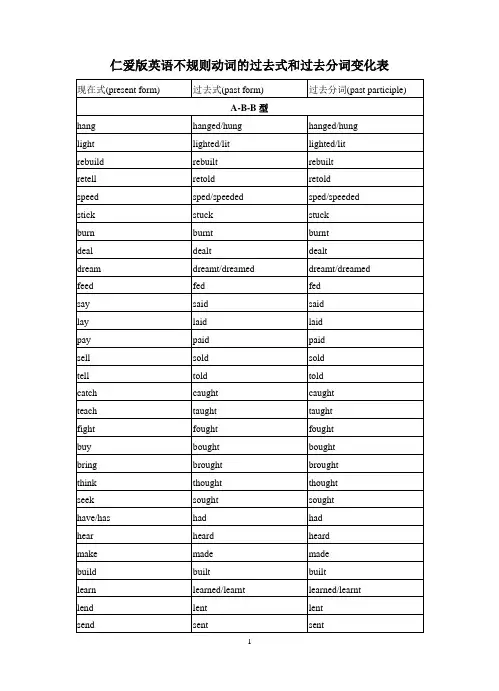
frozen overeaten proven
shake sink wake awake blow draw sing ring drink spring begin swim speak steal break choose bite hide bear tear wear swear rise drive ride write take mistake know grow throw fly
go do give forgive forget see eat fall lie show be(am, is, are)
cut fit put set shut spit spread bet cost hit hurt let read
beat
shall will can may
went
gone
仁爱版英语不规则动词的过去式和过去分词变化表
现在式(present form)
hang light rebuild retell speed stick burn deal dream feed say lay pay sell tell catch teach fight buy bring think seek have/has hear make build learn lend send
3
shaken sunk woken awoken blown drawn sung rung drunk sprung begun swum spoken stolen broken chosen bitten hidden born torn worn sworn risen driven ridden written taken mistaken known grown thrown flown
仁爱英语八年级上Unit3知识点
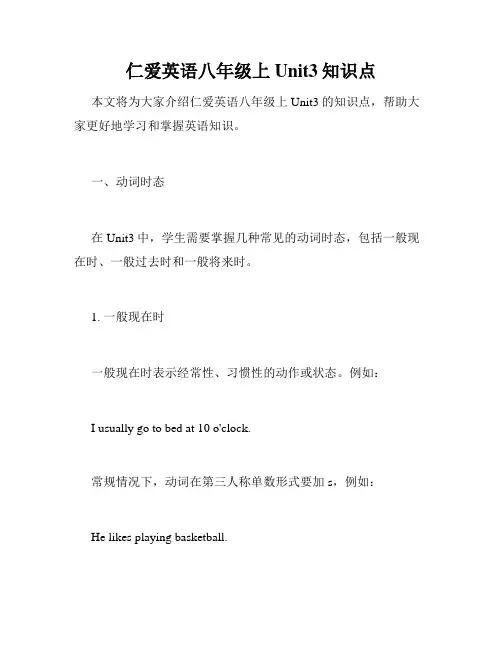
仁爱英语八年级上Unit3知识点本文将为大家介绍仁爱英语八年级上Unit3的知识点,帮助大家更好地学习和掌握英语知识。
一、动词时态在Unit3中,学生需要掌握几种常见的动词时态,包括一般现在时、一般过去时和一般将来时。
1. 一般现在时一般现在时表示经常性、习惯性的动作或状态。
例如:I usually go to bed at 10 o'clock.常规情况下,动词在第三人称单数形式要加s,例如:He likes playing basketball.2. 一般过去时一般过去时表示过去某个时间发生的动作或状态,例如:We went to the park yesterday.常规情况下,动词要加-ed,例如:He walked to school.不规则动词有特殊的过去式形式,例如:go -> wenteat -> ate3. 一般将来时一般将来时表示将要发生的动作或状态。
例如:I will visit my grandparents next week.常规情况下,将来时需要使用will或shall,例如:She will buy a new dress for the party.二、被动语态被动语态是英语语法中的一个重要部分。
被动语态表示主语是动作的承受者,而不是动作的执行者。
被动语态的构成如下:be + 过去分词例如:The book was written by him.三、形容词和副词的比较级和最高级形容词和副词的比较级和最高级是英语学习中必不可少的部分,也是Unit3的知识点之一。
比较级和最高级的构成如下:1. 形容词和副词的比较级形容词的比较级通常在词尾加-er,例如:She is taller than her sister.副词的比较级通常在词尾加-er,例如:He runs faster than me.2. 形容词和副词的最高级形容词的最高级通常在词尾加-est,例如:The cat is the cutest in the park.副词的最高级通常在词尾加-est,例如:He talks the fastest in the class.四、名词性从句名词性从句是由一个名词性词语引导的从句,可以在句子中作主语、宾语和表语等。
2023-2024学年仁爱版英语八年级上册时态复习专题知识总结讲解及真题训练
八年级上册时态复习到本学期目前为止,我们已经会学到五种常用时态,它们分别是一般现在时、现在进行时、一般将来时、一般过去时、过去进行时。
下面,我们来复习一下这五种时态。
时态含义结构时间状语一般现在时表示经常发生的动作或存在的状态。
am / is / are或其他动词的一般现在时形式usually, always, often, every day等一般过去时表示过去发生的动作或存在的状态,也可表示过去经常性的动作。
was / were或其他动词的过去式形式yesterday, in 1992, last year, three daysago等现在进行时表示现在或现阶段正在进行的动作或发生的事。
am / is / are+动词-ing形式now, at the moment等一般将来时表示将要发生的动作或存在的状态。
be going to / will+动词原形tomorrow, next week,in the future等过去进行时表示在过去某段时间内正在发生的事情或行为。
was/were +动词-ing形式at 2:00 yesterday,at this timeyesterday,while / when,then / at thattime / at that moment;when my fathergot home考点1:一般现在时1.一般现在时的构成一般现在时主要用动词原形表示,如果主语是第三人称单数,一般在动词原形后加-s或-es。
如:Tom often at home.汤姆在家经常帮助父母做家务。
Sometimes Lucy herself.有时候露西自己洗衣服。
2.与一般现在时连用的时间状语(1)表示频率的副词always,often,usually,sometimes等。
(2)on Sundays,on Monday afternoons,every day,every morning,every year等时间状语。
仁爱八上不规则动词测试
测验完毕,请停笔。请组长起来收测5 speed 66 spend 67 spit 68 spread 69 sweep 70 swim 71 take 72 teach 73 tell 74 think 75 throw 76 wake 77 wear 78 will 79 win 80 write 81 stand 82 spell
(不规则动词)
英语测验
仁爱· 八年级· 上册
考前请注意
考试时间为:15分钟 请按照PPT上面的题目,在测验本上写 出答案(无需抄题目) 请认真书写作答 不得抄袭作弊否则以0分计算成绩 做完后请认真检查
测
验
如果有两种 写出一种即可
请写出下列单词的过去式。
1.am 2.bear 3.become 4.begin 5.blow 6.break 7.bring 8.build 9.burn 10.buy 11.can 12.catch 13.choose 14.do 15.cost 16.draw 17.dream 18.drink 19.drive 20.eat 21.feel 22.fall 23.feed 24.find 25.fly 26.forget 27.give 28.go 29.grow 30.have 31.hear 32.hit 33.hold
测
验请写出下列动词的过去式
34.keep 35.know 36.learn 37.leave 38 lend 39.let 40.lie y 42.light 43.lose 44.make 45.may 46.mean 47.meet 48.mistake 49.pay 50.put 51.read 52.ride 53.run 54.ring 55.say 56.see 57.sell 58.set 59.shall 60.shine 61.sing 62.sit 63.sleep 64.speak
仁爱 英语 八年级上 不规则动词
got
lend let lie light lose make mean meet put rebuild ring
ride sell send shake shine sit sleep read speed spell stand stick
ran
swim tear teach tell
took throw
be become blow break bring burn buy can come beat began
cost do draw drink drive eat fall feed fight find fit fly
cut
forget give go grow have hit hold hurt know learn
cut
forget give go grow have hit hold hurt know learn
got
sang spoke
wake think wear win wtite say see
heard
would
built
felt
kept
caught
left
原形 过去式
原形
过去式
不规则动词 原形 过去式
cut
forget give go grow have hit hold hurt know learn
got
lend let lie light lose make mean meet put rebuild ring
ride sell send shake shine sit sleep read speed spell stand stick
heard
仁爱英语全六册不规则动词表
仁爱英语全六册不规则动词归类速记
一、按变化形式归类:
ABC 型:
awake be(am/is) be(are) bear begin blow break choose do draw drink drive eat fall fly forget forgive freeze get give go grow hide know lie 躺,平放 mistake overeat prove ride ring rise see shake show sing sink speak steal swim
2
forgotten forgiven frozen gotten, got given gone grown hung, hanged had heard hidden hit held hurt kept known laid led learned, learnt left lent let lain lied lit, lighted lost made meant met mistaken overeaten paid proven, proved put read rebuilt retold ridden
ell → old → old retell sell tell
ell → elt → elt spell smell
began swam rang sang drank sank
blew grew threw knew
got forgot
gave forgave
mistook shook took
take throw wake wear write
ABB 型:
bet bring build burn buy catch deal dig dream feed feel fight find fit get hang have hear hold lay lead learn leave lend lie 说谎 light lose make mean meet pay prove rebuild retell say sell send
